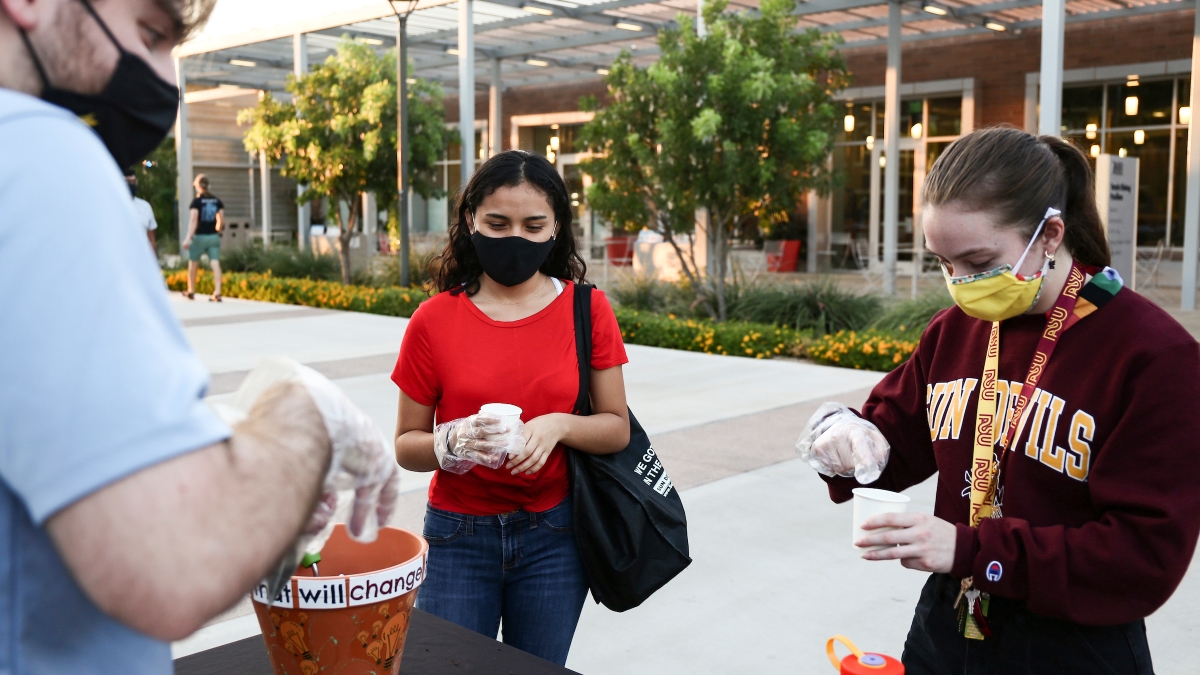Research examines how students react to moral messages about COVID-19

Students Neida Buendia (left) and Nayeli Pohjonen wear face coverings at an outdoor event on ASU's West campus on Oct. 21. Photo by Jenny Dupuis/ASU
According to data collected by a team of Arizona State University researchers, students struggle to balance the safety of vulnerable family members with the need for peer connection. Led by Professor Vince Waldron of the School of Social and Behavioral Sciences and the Lincoln Center for Applied Ethics, the team interviewed on- and off-campus university students as they began the fall 2020 semester to discern what moral messages informed their decision-making during the COVID-19 pandemic.
Preliminary results indicate that taken-for-granted activities of student life — organizing a club, going to the gym, living with roommates, studying in groups, accepting an internship — are now morally fraught, as students weigh the benefits to themselves against the risks these activities create for others. The data will be used to inform a survey about how to better align health messaging with student decision-making.
The study builds on Waldron’s earlier research on negotiated morality theory and how emerging adults form their moral outlook. Waldron, a communication professor and Lincoln Professor of Relationship Ethics, was joined by Lincoln Center Research Associate Erica O’Neil and communication doctoral students Julie Martin, Lucy Niess and Corey Reutlinger.
The team asked students to describe “memorable moral messages” that helped them navigate moral choices in the pandemic. Students found guidance in the memorable words of parents, peers, media, and in at least one case, an ASU professor.
Many of the messages concerned caring for others. “You are not the center of the universe,” one student recalled hearing from a father figure. That message led her to choose online classes even though she considered campus an escape from the responsibilities of family life. “It isn't about us … it's about everyone we care about,” she added.
Some students reported feeling obligated by an ethic of community obligation, expressed as broader concern toward their families, friends and community groups. One student internalized the advice of her parents: “You're part of a community … we're all going through these kinds of things.”
Messages emphasizing the development of self-potential resonated with students while encouraging them to take what they perceived to be reasonable risks. “Sometimes it's really important to put yourself first,” offered one student, quoting her father. Internalizing that message, she risked taking in-person classes and sought work experience in her field. As she explained, “I gotta graduate college, and I'm kind of on my own.”
Messages about personal virtues provided guidance to students, who strove to remain patient, resilient and considerate of their roommates' wishes, even as they chafed at the restrictions that limited social gatherings on and around campus.
One student faced that challenge in organizing a recital for his capstone project. The sense of responsibility he inherited from his parents drove him to be meticulous in implementing safety guidelines during rehearsals, including mask-wearing and social distancing. “I couldn’t live with myself!” he reported, if one of his dancers got sick.
While another student cited the guiding mantra of “be a nice human” as important to informing her moral decision-making, a message heard from both her father and an influential sorority sister. The message motivated her to speak up while visiting a fast-food restaurant located just off campus when she observed three male students refusing to wear face coverings, despite the pleas of an employee who explained that company policy dictated that he could be terminated if he served them. She defended the employee and even offered masks to the recalcitrant customers. “If someone's going to lose their job over something, that's not cool.” When asked why she spoke up, she replied, “I was still trying to be that nice human.”
Implications for health messaging
Although the data are preliminary, they provide several insights for university health educators, particularly as the team transitions into the survey stage of their research.
1. Emphasize love for family. Students are highly motivated to protect family. Health messaging should demonstrate that taking precautions at school will help their parents and grandparents stay healthy. Student audiences may be receptive to messages that remind them that ASU professors and staff also have families that need to be protected from virus transmission.
2. Help students negotiate value conflicts. The students interviewed are struggling to do the right thing for themselves, their roommates and the university community. But they need help in managing value conflicts. For example, students were sometimes reluctant to confront roommates who engaged in risky behavior because they valued both safety and roommate privacy.
3. Emphasize “rightdoing” over wrongdoing. Rather than emphasize behavior that is irresponsible or “wrong,” feature students who do things right, by, for example managing student clubs safely, having fun with friends in a socially distanced manner, or offering masks to those who lack one.
More Health and medicine

College of Health Solutions alumnus named Military Medic of the Year
By Keri Hensley and Kimberly LinnJonathan Lu has looked out for the health of his fellow military service members his whole…

ASU, Mayo Clinic forge new health innovation program
Arizona State University is on a mission to drive innovations that will help people lead healthier lives and empower health care…

Innovative, fast-moving ventures emerge from Mayo Clinic and ASU summer residency program
By Georgann YaraIn a batting cage transformed into a custom pitching lab, tricked out with the latest in sports technology,…